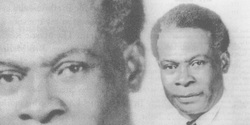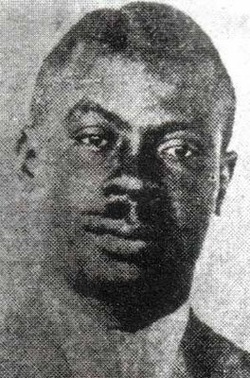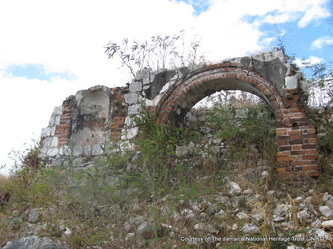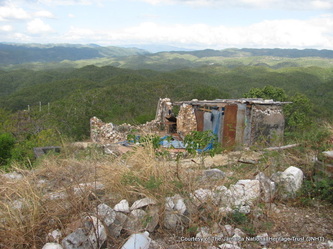 Leonard P. Howell Leonard Percival Howell was born on June 16, 1898 at May Crawle in the Bull Head Mountain district of Clarendon. He was the eldest of 10 children born to Charles Theophilus Howell, a tailor and peasant farmer, and Clementina Bennett. While details of his early life are sketchy, Robert Hill in his publication Dread History: Leonard P Howell and Millenarian Visions (2001) reported that Howell claimed to have been a soldier in Panama and at Kingston’s Up Park Camp. Howell is also reported to have said that he was once a guard at Bumperhall Hospital, near Kingston, before being sent back to Colon, Panama. On his second assignment in Panama he was a cook in the United States Army Transport Service. Records from the Federal Records Centre in Bayonne, New Jersey, indicate that on May 19, 1924 he filed a Declaration of Intention to become a United States citizen. He also worked on various construction sites and even operated a tea room in Harlem, New York. Howell also had his run-ins with the law while in the United States. In January 1931, he was convicted by the Queens County Court at Long Island City, New York, on charges of burglary, grand larceny, and receiving stolen property and he served a two to four year sentence in the state prison at Ossining (popularly known as Sing Sing prison). In November 1932, he was, however, deported to Jamaica “on the grounds that he was sentenced, subsequent to May 1st, 1917, to imprisonment for a term of one or more for a crime involving ‘moral turpitude’. It was during these latter years in the United States that Howell is reported to have come under the influence of Trinidadian scholar and politician George Padmore, a prominent member of the American Communist Party. Robert Hill suggests that Howell may have internalised socialist ideologies which were the foundation of his Rastafarian movement in Jamaica.Howell’s return to Jamaica coincided with an upsurge of religious revivalism and the attendant criticisms for the colonial establishment. Hill points out that such resistance ranged from proposed legislation aimed at stemming its growth and island wide spread, to intellectual arguments such as that poised by one E.A. Glen Campbell who stated “it is regrettable that our labouring population especially in towns and villages are drifting away from the civilizing influence of the Christian Church; and following no end of strange religion that can do them no good.” Jamaica in the 1930’s was, thus, an environment which was not conducive to radical religious teachings and anti-establishment philosophies, such as that already being espoused by Marcus Mosiah Garvey. Incidentally, Howell met Garvey while in Harlem and had become a member of the Universal Negro Improvement Association (UNIA) while in the United States. Howell’s socialist background was merged with his immersion in Ethiopianism, the concept that Ethiopia is the birthplace of the human race and more specifically the African/Black Ethiopian race. Ethiopia was also recognised by its adherents as being a sacred place, a place where God found favour on earth and where He loved to “dwell”, according to the Psalms. As a corollary to that philosophy was the belief that Ras Tafari Haile Selassie I was a divine being. This belief was articulated in publications such as The Holy Piby (the Blackman’s Bible), which was published in New Jersey in 1924 and The Royal Scroll of Black Supremacy, published in Jamaica in 1926. Howell, himself, was to publish The Promised Key in 1935 in which he boldly asserted the divinity of Ras Tafari as follows: His Majesty Ras Tafari is the head over all man for He is the Supreme God. His body is the fullness of Him that filleth all in one. Now my dear people let This be our goal. Forward to the King of Kings must Be the cry of our social hope So, despite being in a space hostile to revolutionary ideologies, Howell in Jamaica in the 1930’s was determined to establish an organisation and a community of believers in a philosophy which espoused the Divinity (Ivinity) of Ras Tafari, Haile Selassie I and which sought to provide a black counter socio-religious philosophy to that of the established Church and the structure of colonial Jamaica.  Leonard P. Howell (circa. 1940) It is important to note that Howell went to Garvey in a bid to seek assistance with the spread of his doctrine but was greeted with strong resistance. It is reported that Garvey denied Howell’s request, in 1933, to offer for sale photographs of the recently crowned Emperor Haile Selassie I in Edelweiss Park, the then headquarters of the UNIA. In quick response, Howell went to the steps of the Coke Methodist Chapel and started to sell his photograph of Haile Selassie. The photograph of the crowned Emperor was footnoted “Ras Tafari – King of Kings of Ethiopia – Descendant of King Solomon and the Queen of Sheba – Presented by Leonard P Howell – Traved. The World Through.” Howell also stated to deliver speeches on Haile Selassie and on the empire of Abyssinia. His campaign to sensitize the masses to the divinity of Haile Selassie I as the King of Kings and Lord of Lords, started in Kingston but was initially met with little success. He moved to St. Thomas in April 1933, a parish with a strong anti-colonial heritage, to spread his doctrine. On April 18, 1933 he delivered a speech at Trinityville described as being filled with “words of a seditious nature” before a meeting of some two hundred persons. It was at this time that Howell started to gain the attention of the Police who began to attend his meetings. Indeed, a corporal in attendance at the Trinityville speech made the following record: I heard Leonard Howell, the speaker, said to the hearers: “The Lion of Judah has broken the chain, and we of the black race are now free. George the Fifth is no more King. George the Fifth has sent his third son down to Africa in 1928 to bow down to our new king Ras Tafair. Ras Tafair is King of Kings and Lord of Lords. The Black people must not look to George the Fifth as their King anymore – Ras Tafair is their king…” This correlates to Howell’s later writing of the significance of this interaction between the Duke of Gloucester and the Emperor in The Promised Key. In a chapter entitled “The Mystery Country” Howell wrote: The Duke fell down bending on knees before His Majesty Ras Tafari the King of Kings and Lord of Lords and spoke in a loud tone of voice and said, “Master, Master my father has sent me to represent him sir. He is unable to come and he said that he will serve you to the end Master Howell further explained that the gift that was brought by the Duke of Gloucester to Haile Selassie was a “Sceptre of gold twenty seven inches long of which had been taken from the hands of Ethiopia some thousand years ago”. The presentation by Gloucester, Howell suggested, was the fulfilment of biblical prophecy in particular Psalms 72: 9-11 which reads: “..they that dwell in the wilderness shall bow before him, and his enemies shall lick the dust. The kings of Tarshih and of the isles shall bring presents; the kings of Sheba and Sheba shall offer gifts. Yea, all kings shall fall down before him; all nations shall serve him.” Howell also made reference to Genesis 49:10 which reads “The sceptre shall not depart from Judah, nor a lawgiver from between his feet, until Shiloh come; and unto him shall the gathering of the people be.” Howell’s philosophy soon put him in trouble with the law. On January 1, 1934, Howell and Robert Hinds, one of his loyal followers, were arrested and charged with two counts of sedition each, arising out of speeches made on December 10, and 21 at Seaforth District and Chapel Hill in Port Morant. Both men were tried and found guilty and Howell received a sentence of two years. After his incarceration, in a bid to establish a community of believers and a space where he could put to practice the way of life espoused in his teachings, Howell sought land which he could occupy and be far removed from the tentacles of the Police force, which had destroyed previous Rastafarian settlements. Oral accounts indicate that Howell bought a 500 acre property in Sligoville, St. Catherine from a Mr. Albert Chang in 1940. The property was later named Pinnacle. It is reported that he was able to buy this property from profits made from a bakery he operated in Kingston. Chevannes cites an informant who reported that the bakery was run in an unusual manner but one which complemented Howells ‘criticism of colonialism’ as “when a poor man go there and buy a piece of bread you get a little sugar free and a little cornmeal” Chevannes’ informant also revealed that at Pinnacle marijuana was grown on such as scale as to render Howell the first ganja farmer: “Anywhere through the island a man want ganja fi buy is right here him come….He carry the best herbs.” Ganja was thus grown as Howell’s main cash crop and it served to satisfy growing demand for the weed in Kingston. It is important to note that ganja was not only produced for sale, but was used by the Rastafarians as a sacrament and is still an important component of their religious rituals. But ganja was not the only cash crop that the self-sufficient commune grew. Pinnacle was the source of food in times of shortage and drought and it was reported that Pinnacle supplied the Government prison with food on occasions. Items such as gungo peas, cow peas, read peas, sweet potato, yam and coco were cultivated along with livestock including fowls, cows, goats and beast of burden. Interestingly, Chevannes noted, however, that pigs, ducks and pigeons were taboo in the settlement. Food was also stockpiled for emergencies and in case of natural disaster. Chevannes provided a glimpse of life at Pinnacle. The children at Pinnacle attended an infant school within the community before venturing out to school in nearby communities and there was a practice of communal labour. He further described the space as follows: On the edge of a small pond used for watering and livestock, the community lived in tenement flats, every three or four of which were separated by lanes with given names (e.g., Corn Lane)….On Sundays it was customary for Howellites who owned goats to slaughter and sell them to members who did not. And after the Sunday dinner they would gather in the parade, dancing and singing to the rhythms of the baandu and funde, the two kumina drums. Pinnacle was raided several times between 1941 and 1957. During the final raid, the settlement was burnt to the ground by the Police forces. In summation, Howell was instrumental in establishing and expanding the fledgling Rastafarian movement in Jamaica, especially at a time when anti-establishment philosophy was shunned, repudiated and violently put down. As self–styled “President General” of the body known as the King of Kings’ Mission, Howell also represented Ras Tafari in Jamaica in the capacity as Ambassador. He was also a teacher of the livity or the lifestyle and behavioural codes of Rastafarians and taught the tenets of their religion through publications such as The Promised Key and a newspaper called The People’s Voice. Were it not for his activities and the laying of a strong foundation the Rastafarian movement may not have been able to withstand the onslaught of state persecution in the 1930’s and even later incidents such as the Coral Gardens Massacre in 1963. Leonard Howell died in February 1981. He is buried at Dovecot Memorial Park in the parish of St. Catherine. Bob Marley also died the same year and both men had the same nickname "The Gong". you may also like :
1 Comment
|
TOPICSAll 4th Dimension 80s 90s A Brighter Place Accident Agaent Sasco Aidonia Albums Amy Winehouse Anthony B Aritsts Art Artist Artist.music Artist Spotlight Assassin Baltimore Banton Beenie Man Beres Hammond Better Must Come Big Ship Bike Crash Billboard Charts Blak Ryno Bob Marley Bounty Bounty Killer Brooklyn Bubble Like Soup Buju Buju Banton Bunji Garlin Busta Rhymes Charity Christafari Christian Christopher Dudus Coke Classic Reggae Clean Game Cartoon Cloak And Dagger Cocoa Tea Comedy Concert Corey Todd Correy Todd Cottage In Negril Culture Damian Marley Dancehall Delilah Di Genius Diplo Distant Relatives Dj Khaled Dj Mehdi Dj Powa Documentary Don Corleon Donny Yardas Dont Get Weary Drake Dubstep Duke Reid EDM Electro Elephant Man Ernie Smith Ethiopia Fashion Featured Artist Flexxx Friday Gangalee Ganja Gappy Ranks Garnett Gaza Ginjah God Alone Good Gospel Grammy Museum Guyana Haile Selassie Hemp Hip Hop Jah Vinci Jamaica Jamaican Movie J Cole Jimmy Cliff Joseph Hill Josh Stone Junior Kelly Junior Reid Kevin Little Khago Lady Saw Lawsuit Leonard P. Howell Lisa Hyper Listen Tune Little Hero Logwood Productions Louie Culture Lovers Rock Story Luciano Macka Diamond Major Lazer Mama Marijuana Matisyahu Mavado Maxi Priest Menelik Shabazz Merciless Mick Jagger Midnite Mixtape Mixtapes Money Monterey Bay Reggaefest Mr. Vegas Ms Dynamite Murder Murder Case Music Music News My Experience Nas New Music Neyo Nicki Minaj Nigeria No Pain Party Passed Away Pepper Petition Phillip Fattis Burrel Phyllis Dillion Pop Popcaan Protoje Rastafari Reggae Reggae Music Reggae News Reggae Roots Reggae Sumfest Reggae Super Cat Ricardo Drue Richard Booker Riddim Riddimdaddy Riddim Daddy Rihanna Roksonix & Statelapse Rolling Stone Magazine Roommate Roots Roots Reggae Sacred Fire Sanchez Schlachthofbronx Sean Kingston Sean Paul Set Up Shop Sex Tape Shabba Shaggy Shawty Remix Shystie Silk Simon Cowell Sizzla Soca Sports Spragga Benz Sting 2011 Super Heavy Swag Team Riddim Teddy Afro The Tamlins Timberlee Toi Tony Matterhorn Toots And The Maytals Trevor Sparks Tune Of The Day Twins Of Twins Tyrone Taylor Ub40 Uk Usain Bolt Video Vybz Kartel Vybz Kartel Jamaican Police Ward 21 Weird Westward Bound We The Best Music Group Worl Boss Xterminator Yaad Stout Yasmin Shahmir Zeds Dead Archives
April 2019
DISCLAIMER
everything shared here is strictly for promotional and entertainment purposes only. If you are the owner of any material shared here and wish to have it removed feel free to contact us via the contact form and your material will be removed. |
Search by typing & pressing enter





 RSS Feed
RSS Feed


